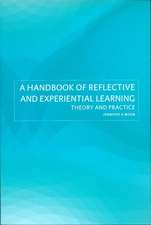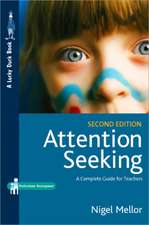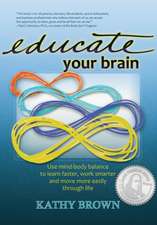Learning Styles in Action
Autor Barbara Prashnigen Limba Engleză Paperback – 12 apr 2006
Understanding how individuals learn is central to personalizing learning. In this practical guide to learning styles, Barbara Prashnig explains how to implement personalized learning in real and varied contexts: what to do and what to avoid, and how to combine learning styles with your existing teaching methods to enhance curriculum delivery. Drawing on her vast experience of learning styles around the world, Barbara looks at issues such as:
- how learning styles can help 'problem' students
- multisensory teaching and learning, beyond VAK
- ways to integrate learning styles and ICT
- creating a learning styles classroom
- the do's and don'ts of using learning styles.
Each of the 24 chapters describes a particular aspect of style diversity and how to apply it in different situations - from nursery to university, from homework to exams, to sports coaching and sustaining change programmes in schools.
Specially designed to be ultra user-friendly, Learning Styles in Action enables anyone to easily find out not only what personalized learning is all about but also how to make it happen.
- multisensory teaching and learning, beyond VAK
- ways to integrate learning styles and ICT
- creating a learning styles classroom
- the do's and don'ts of using learning styles.
Each of the 24 chapters describes a particular aspect of style diversity and how to apply it in different situations - from nursery to university, from homework to exams, to sports coaching and sustaining change programmes in schools.
Specially designed to be ultra user-friendly, Learning Styles in Action enables anyone to easily find out not only what personalized learning is all about but also how to make it happen.
Preț: 143.20 lei
Preț vechi: 248.87 lei
-42% Nou
Puncte Express: 215
Preț estimativ în valută:
27.41€ • 28.50$ • 22.73£
27.41€ • 28.50$ • 22.73£
Carte disponibilă
Livrare economică 17-31 ianuarie 25
Preluare comenzi: 021 569.72.76
Specificații
ISBN-13: 9781855392083
ISBN-10: 1855392089
Pagini: 208
Dimensiuni: 210 x 297 x 292 mm
Greutate: 0.56 kg
Editura: Bloomsbury Publishing
Colecția Network Continuum Education
Locul publicării:London, United Kingdom
ISBN-10: 1855392089
Pagini: 208
Dimensiuni: 210 x 297 x 292 mm
Greutate: 0.56 kg
Editura: Bloomsbury Publishing
Colecția Network Continuum Education
Locul publicării:London, United Kingdom
Cuprins
Preface by Chris Dickinson
Introduction
How to use this book
Dedication and thanks
1. Personalised learning through learning styles
2. Learning styles around the world
3. LSA - learning style analysis instruments
4. TSA - teaching style analysis instrument
5. How to start, monitor and evaluate a learning styles programme
6. How to use LSA group profiles with students
7. How to create learning style classrooms
8. How to 'double track' when teaching analytic and holistic students
9. Multisensory teaching and learning
10. How to help tactile students learn better
11. How to accommodate kinesthetic learners
12. What to do with students who cannot sit still
13. How to use LS with 'problem' students
14. How important are time preferences and the need for intake?
15. What to do when students cannot work quietly and need sound
16. How to combine LS with Information Communication Technology (ICT)
Introduction
How to use this book
Dedication and thanks
1. Personalised learning through learning styles
2. Learning styles around the world
3. LSA - learning style analysis instruments
4. TSA - teaching style analysis instrument
5. How to start, monitor and evaluate a learning styles programme
6. How to use LSA group profiles with students
7. How to create learning style classrooms
8. How to 'double track' when teaching analytic and holistic students
9. Multisensory teaching and learning
10. How to help tactile students learn better
11. How to accommodate kinesthetic learners
12. What to do with students who cannot sit still
13. How to use LS with 'problem' students
14. How important are time preferences and the need for intake?
15. What to do when students cannot work quietly and need sound
16. How to combine LS with Information Communication Technology (ICT)
17. How to integrate LS and Multiple Intelligences (MI)
18. How to fit LS into a full learning cycle
19. Examples of LS use in different educational settings
20. Do's and don'ts with learning styles
21. How to sustain a learning styles programme
22. What about testing and exams?
23. New leadership in schools during change and beyond
24. A look into the future: LS utopia or personalized learning for all?
Conclusion
Online Resources
Useful Websites
Further Reading
Index













